【创新设计】(新课标)高中英语 Unit 24 Society Period Four Less
- 格式:doc
- 大小:48.50 KB
- 文档页数:7
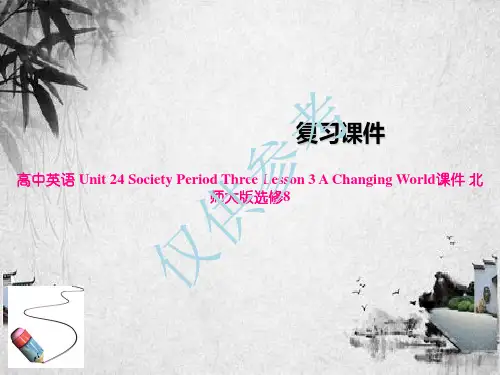
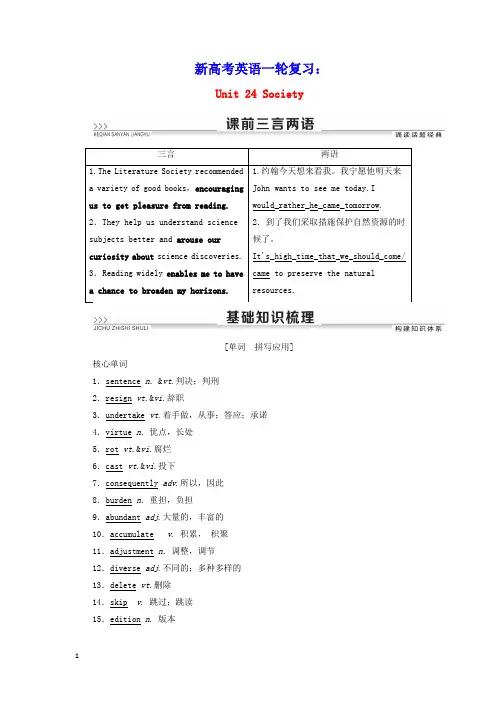
新高考英语一轮复习:Unit 24 Society三言两语1.The Literature Society recommendeda variety of good books,encouragingus to get pleasure from reading.2.They help us understand sciencesubjects better and arouse ourcuriosity about science discoveries.3.Reading widely enables me to havea chance to broaden my horizons.1.约翰今天想来看我。
我宁愿他明天来John wants to see me today.Iwould_rather_he_came_tomorrow.2.到了我们采取措施保护自然资源的时候了。
It's_high_time_that_we_should_come/came to preserve the naturalresources.[单词拼写应用]核心单词1.sentence n.&vt.判决;判刑2.resign vt.&vi.辞职3.undertake vt.着手做,从事;答应;承诺4.virtue n.优点,长处5.rot vt.&vi.腐烂6.cast vt.&vi.投下7.consequently adv.所以,因此8.burden n.重担,负担9.abundant adj.大量的,丰富的10.accumulate v. 积累,积聚11.adjustment n.调整,调节12.diverse adj.不同的;多种多样的13.delete vt.删除14.skip v. 跳过;跳读15.edition n. 版本16.thirst n.渴望;口渴17.fine v.罚款18.abolish vt.废除,废止;取消19.swing vi.摇摆;秋千[语境运用] 用所给词的适当形式填空。
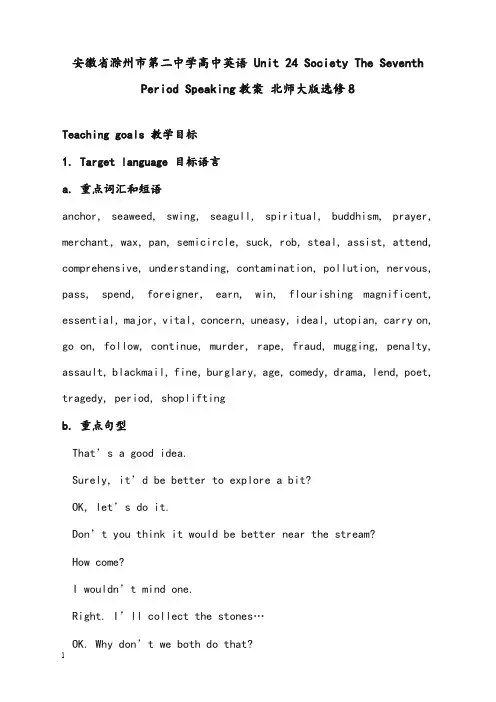
安徽省滁州市第二中学高中英语 Unit 24 Society The Seventh Period Speaking教案北师大版选修8Teaching goals 教学目标1. Target language 目标语言a. 重点词汇和短语anchor, seaweed, swing, seagull, spiritual, buddhism, prayer, merchant, wax, pan, semicircle, suck, rob, steal, assist, attend, comprehensive, understanding, contamination, pollution, nervous, pass, spend, foreigner, earn, win, flourishing magnificent, essential, major, vital, concern, uneasy, ideal, utopian, carry on, go on, follow, continue, murder, rape, fraud, mugging, penalty, assault, blackmail, fine, burglary, age, comedy, drama, lend, poet, tragedy, period, shopliftingb. 重点句型That’s a good idea.Surely, it’d be better to explore a bit?OK, let’s do it.Don’t you think it would be better near the stream?How come?I wouldn’t mind one.Right. I’ll collect the stones…OK. Why don’t we both do that?It’s freezing.My feet are blocks of ice.I’m dying for a cup of coffee.I suppose he is getting on a bit.2. Ability goals 能力目标Enable students to make proper reactions to suggestions in communication.Enable students to use exaggeration in speaking.3. Learning ability goals 学能目标Help students learn how to prepare for problem solving task. Teaching important and difficult points 教学重难点Speaking strategy: prepare for problem solving.Teaching methods 教学方法Listening, speaking and discussing.Teaching aids 教具准备A multi-computer, a recorder.Teaching procedures & ways 教学过程及方式Step I RevisionCheck the homework.Check answers to Ex 1 with the whole class.Check answers to Ex 2 by having individuals write their sentences on the board.Check answers to Ex 3, 4 and 5 by asking individuals to tell out their answers, and then check together.Suggested answers to Ex 4:Debbie and Lily went on holiday to Beijing. First, they toured the Great Wall. Second, they walked through some hutongs. They then visited the Forbidden City. After that, they shopped and had a meal. They left the next day.Step II Listening: A songRead out the instructions to the class.Students work in groups of three or four, discussing the generation differences. Apart from differences, ask the class if there are any similarities between the two generations.T: We are very familiar with “the generation gap”. It’s said that there are differences between the children’s generation and their parents’ generation. Parents can not understand the children and can not be understood by the children. So a gap appears, though they live together. Now work in groups of three or four, discussing the generation differences. Think about these things: (Show a)…b)… c)… on the PowerPoint). Later, I’ll ask some groups to report your results to the class.…S1: As to tastes in music, most parents enjoy classical music or folk music, while the young prefer pop music. As for clothes, the young prefer fashion. They would more like to present their individual character through their clothes.S2: As to the attitudes to work and money, most young people seeka higher salary and changes. They may not like to stayunchangeable. But the parents would like to be stable.S3: As to marriage, most parents prefer their children to marry early and live with them, while the young hope to have his own life first and live independently after their marriage.T: So many differences! But I think there are surely similarities between the young and the parents, don’t you think so?S4: Yes. Though there are differences between the two generations, there are also something similar between them. For example, we can see both the young and the old in some sports games.…T: Good. So I think this gap can be filled if there are more understanding and acceptance.Deal with Ex 2Give students time to read the sentences before playing the cassette. Play the c assette twice for students to listen and find out who said each sentence.T: Have you ever listen to the song “Father and son” by Cat Steven? Ss: Yes / No.T: On Page 41, in Ex 2, there are fourteen sentences from the song. Now read the sentences and guess who said these things, the father or the son. Then I will play the cassette for you to check if you guesses are correct.Check the answers with the class as a whole.Deal with Ex 3Read out the questions to the class. Play the cassette again for students to experience the feelings of the father and the son. Discuss these answers to the question in pairs or groups of three. Tell them there are not “right” or “wrong” answers to the questions. They need to interpret the song and the feelings of the father and son.Suggested answers:1. The situation is that: the son wants to change his present situation and go away while the father asks him to get married and se ttle down. The son wants to go away because he doesn’t want to listen to his father’s old story and want to have his own life.2. The father advises his son to get married and settle down.3. The father may feel bad. The son may feel boring.Step III Speaking: Problem SolvingDeal with Ex 1Have students look at the photo and talk about it.Read the instructions to the class. As a whole class, students discuss what they would miss most in this situation.T: Look at the picture. Where are the three young people? Why are they there? What are they doing?S: In my opinion, they are in the wild. Maybe they are undertaking a camp and field training. Now they are discussing which road to take next.T: If you had to spend two weeks hiking on a mountain without any of the comforts of home, what would you miss most?Ss: Hot water, bread, fire …Deal with Ex 2T: In pairs, please discuss what would be the biggest survival problems for you?Deal with Ex 3&4Listen to three people on a survival course. Then say which of the problems in Exercise 2 are mentioned. Check students’ answers by playing the cassette again, pausing it after each answer.When dealing with Ex 4, give students time to read the expressions before play the tape again.T: Now, please read the expressions first. The expressions a-h are spoken immediately after the expressions 1-8. Each pair express the same meaning, but in quite different way. While listening, please match the expressions.Play the tape. Then check the answers.T: Then, please discuss which expressions involve exaggeration and which involve understatements.A sample discussion:S1: I think the expressions: 1 2 3 f 5 6 a d are exaggeration while the rest are understatements.S2: Yes. We also use such expressions a lot in Chinese.T: Listen to the tape again, pay attention to the reactions to suggestions. Let’s begin.After listeningT: Who’d like to read out the negative reactions to the class? S: Let’s me try. These negative reactions are:Surely, it’d be better to explore a bit.It’s quite big, but I don’t see why we have to build it near here.Don’t you think it would be better near the stream?Surely, we can do that when it’s finished.T: Good. Then turn to Page 90, try to finish Ex 1. Look at the pictures and complete what the people are saying, using idiomatic expressions.Check the answers by having individuals read out their sentences. T: Who’d like to read out your sentences for the first picture? S1: Let me try. It’s freezing in here.T: Right. What’s the second one?S2: Yes, my feet are blocks of ice.T: Then the third one?S3: I’m dying for a cup of coffee.T: Right. What about the fourth one?S4: If you’re homeless you can’t get a job; if you can’t get a job, you can’t pay rent. It’s a vicious circle.T: Good. What about the last one?S5: House prices have rocketed this year.T: Good. You’ve all done a good job.Step IV PronunciationDeal with Ex 6Play the cassette two or three times for students to listen to the words said slowly, then fast.Ask students to repeat the phrases after the cassette.T: Now listen to the tape first, please identity which of these sounds disappear or are added: /t/, /d/, /r/, /v/. Then repeat the phrases after the cassette.Answers:1 start-/t/ disappears2 let’s-/t/ disappears3 explore-add /r/ at end of “explore”4 best place-/t/ disappears5 for a cup-add /r/ at end of “for”6 cup of coffee-/v/ disappears, just schwa7 could build-/d/ disappears 8 need people-/d/ disappears9 some of them-/v/disappears 10 before it-add/r/ at end of “before”Step V Speaking strategiesStudents will be asked to make group decisions about how to survive in the wild, following the stages below.Stage 1Read the speaking strategies to the class and explain that they are going to follow these strategies in the next stages.Read out the instructions to the class and check that students understand any new vocabulary, e.g.: “fish hooks”.Stage 2Give students time to look back at the expressions in Function File on Page 37 and Chatroom on Page 42. In groups of three, students practice making suggestions and reacting to them.Stage 3In their groups, students identify the most important problems, suggest and agree solutions and decide how to share the jobs. T: Now, if you are asked to spend two weeks in a forest in groups of three, what do you do to survive in the wild? … Please first read the speaking strategies for preparing for problem solving. Because you are asked to follow these strategies in the next stages.Students read the strategy silently.T: OK, let’s look at the task information; discuss them with your partner. Next, you have several minutes to look back at the expressions in Function File on Page 37 and Chatroom on Page 42. Please think of suggestions to help you survive and work in group of three, practice making and reacting to suggestions. Then, you should identify the most important problems, suggest and agree solutions and decide how to share the jobs.T: OK, now imagine you are in the wild. Please make your plan to survive.A sample of the dialogue:A: OK, so here we are. We must survive for two weeks in the forest, but we have only the equipment-knife, fish hooks, torch, flint, first aid kit, cooking pan, water bottle, and food for one day. B: Yes.C: I think the most important problem is to get a shelter built.It’s colder in the night and we also need to protect ourselves from dangerous animals.A: That’s a good idea.B: Surely, it’d be better to explore a bit? We should find the best place.C: OK, let’s do that.C: OK, let’s start, shall we?A: Good, I’ll collect some stones and make the wall for the shelter.And we need people to cut branches.B: OK, why don’t we both do that?C: I’d rather you cut the branches. I’ll carry them and let’s put some of them on the ground to sleep on.B: Surely. Let’s get going. And then we can make a fire to make something to eat.Step VI TalkbackIn turn, each group tells the class their plan to survive.The class then votes for the group with the best chance of surviving.Step VII HomeworkFinish the unfinished exercises on Pages 90 and 91.*。
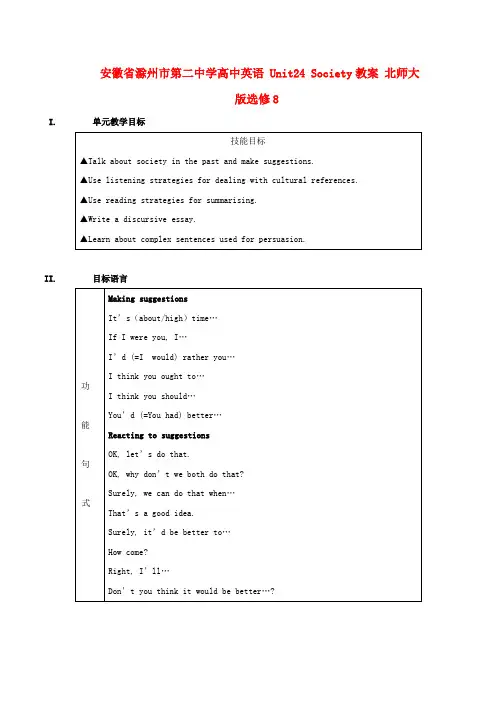
安徽省滁州市第二中学高中英语 Unit24 Society教案北师大版选修8I.单元教学目标II.目标语言III.教材分析与教材重组1. 教材分析本单元以“社会”为话题,我们每个人都处于大大小小的社会中。
如果脱离社会,我们每个人都无法正常生存下去,所以我们每个人都应为建立一个和谐社会而努力奋斗。
本单元的课文及练习的设计全部围绕本单元话题——社会展开。
单元共分8个小板块,板块序列为:单元话题导入阅读(语法)听力(技能)阅读(技能)表达(写作和口头表述)Language Awareness(语法)文化交流Bulletin Board。
本单元要求学生掌握虚拟语气及情态动词表达建议的复杂句型。
本单元还向学生提供了阅读技巧、听力技巧和口头技巧,以便提高他们的综合语言技能。
最后要求学生按照写作指导写一篇关于社会犯罪与处罚的短文。
教材设计体现了跨学科的特点。
本单元通过学习消费型社会、乌托邦、变化的世界、犯罪与处罚等文章,内容涉及中西方文化,帮助学生了解文化差异的同时使他们对本国文化有了更深的理解。
文章内容紧贴生活,具有现实意义,为中学生所感兴趣,并对中学生的生活消费观具有引导意义。
本单元还介绍了我国古建筑艺术——胡同,让学生了解我国的本土艺术文化,珍惜文化遗产。
教师要借助听、说、读、写等一系列扎实有效的教学活动,提高语言运用能力的同时,拓展学生的思维空间,增强学生的社会文化意识。
1.1本板块的第一部分是阅读。
活动设计共有三个:Activity 1是Pre-reading activity, 目的是通过照片、文章题目鼓励学生来猜测文章内容,激活学生的背景知识,提高阅读理解能力。
Activity 2是Post reading activity,回应Activity 1。
可以要求学生快速阅读,核对在Activity 1中的选择。
Activity 3是课后讨论,促使学生熟悉课文内容,了解消费型社会,把握作者的观点,形成自己的观点,促进学生关心社会问题,思考社会问题,为建立和谐社会出谋划策,尽自己所能。
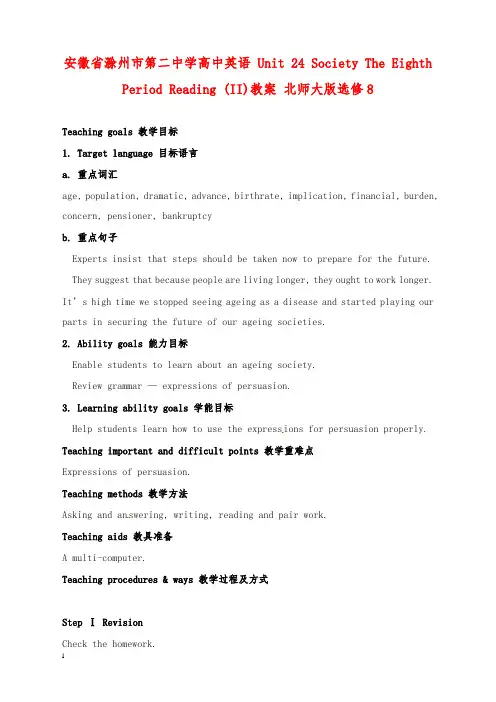
安徽省滁州市第二中学高中英语 Unit 24 Society The Eighth Period Reading (II)教案北师大版选修8Teaching goals 教学目标1. Target language 目标语言a. 重点词汇age, population, dramatic, advance, birthrate, implication, financial, burden, concern, pensioner, bankruptcyb. 重点句子Experts insist that steps should be taken now to prepare for the future. They suggest that because people are living longer, they ought to work longer. It’s high time we stopped seeing ageing as a disease and started playing our parts in securing the future of our ageing societies.2. Ability goals 能力目标Enable students to learn about an ageing society.Review grammar — expressions of persuasion.3. Learning ability goals 学能目标Help students learn how to use the express ions for persuasion properly. Teaching important and difficult points 教学重难点Expressions of persuasion.Teaching methods 教学方法Asking and answering, writing, reading and pair work.Teaching aids 教具准备A multi-computer.Teaching procedures & ways 教学过程及方式Step Ⅰ RevisionCheck the homework.Check the answers to Ex 2, 3, 4, 5 and 6 with the class as a whole.Check the answers to Ex 7 by having individuals write the words on the board and then check together.Step II Language Awareness 9Deal with Ex 1Pay attention to the title “Are Societies Ageing Too Fast?”.T: How do you understand “age” here? … It is used as a verb here, which means “to become older”. Now read the text and answer the questions in Ex 1. Students read the text and answer the questions.Check answers by having students reading out their answers.Suggested answers:1. An ageing society is one in which the population of people over the age of60 is increasing.2. One reason is that dramatic health advances have added 20 years to the average life-expectancy; another is that birthrates have dropped as people, especially women, are educated.3. In an ageing society, a huge financial burden will be placed on the government. Another problem is that as medical expenses increase with age, the demandsof the growing aged population will eventually cause medical schemes to face bankruptcy.4. They suggest people to work longer, and the government to establish a sound social security system. They also suggest that individuals start saving as soon as possible to ensure a financially secure retirement.Deal with Ex 2Go through the list of words with the class. Students work in pairs, discussing what they need to prepare for the future. Have one or two students tell the class what they need to prepare for the future.T: Look at the expressions in Ex 2: should, ought to, insist, suggest, it’s high time. Work in pairs, and tell your partner what he or she should do to prepare for the future usin g the words.Then ask some students to tell their ideas.T: Who’d like first to tell the whole class your suggestions?S: Let me try. I think we should develop good health habits now and take regular exercise. We also ought to save money to en sure a f inancially secure retirement.Deal with Ex 3Students do the exercise individually. Then, students compare their answers in pairs. Check answers by having students read out the sentences.Deal with Ex 4Students do the exercise individually. Then, students compare their answers in pairs. Check answers as a class.Deal with Ex 5Students discuss the question in pairs. Have one or two students report back on whether their partners thought they needed to change their lifestyles. T: Up to now, we have known some possible problems when we are getting old. As far as your own lifestyle is concerned, do you think you need to change your present lifestyle to ensure you have a healthy and comfortable old age! Of course, you can have a discussion about this question with your partner.A few minutes laterT: Who’d like to report your discussion result?S: I think I needn’t to change my present lifestyle. I take exercise everyday. And I have a healthy diet. I feel sure of my health. I also have a habit of saving money. So I don’t worry a lot about my old age.T: Thank you. I hope you have a happy life forever.Step III Expressing regret (P83)T: We’ve learned some expressions for making suggestions. Next let’s learn some similar expressions used to express regret. Look at the screen please. Show the following on the screen.If only…I should have done…I wish…I regret…It’s a pity that…Step IV Emphasis and PersuasionDeal with the Ex 1 on Page 96.Rewrite the sentences using the beginnings provided.Emphasis: 2, 3, 6, 8, 9, 10, 13, 15,16,17,18Persuasion: 1, 4, 5, 7, 11, 12, 14, 19, 20Ask students to work individually, and then check the answers by having individuals reading out their answers. Then sum up the sentence patterns for emphasis:It is/was … thatWhat … be…All … is…Suggested answers to Ex 11 If I were you I’d stop worrying about my weight.2 It was for only $100 that the robbers killed three people.3 What I only really enjoy is old Charlie Chaplin’s comedies.4 It’s high time the government reduced taxes.5 I insist that you change your attitude to customers.6 Hardly ever does the president attend these meeting.7 I’d rather you didn’t always leave a mess in the kitchen.8 Not only did Nick spill red wine on my best suit but he also said it was my fault.14 Had he realized the house was on fire he’d have run away.15 Seldom are our politicians concerned with the poor.16 It was to the theatre that he invited me, not to the cinema.17 When the children came in we had just hidden the presents.18 All they were expecting was a lift to the nearest town.19 The captain demands that all passengers switch off their mobiles immediately.20 You ought to do some sport.Step V Homework1. Finish Ex 2 on Page 96.2. Go over the sentences in Ex 1 on Page 96.。
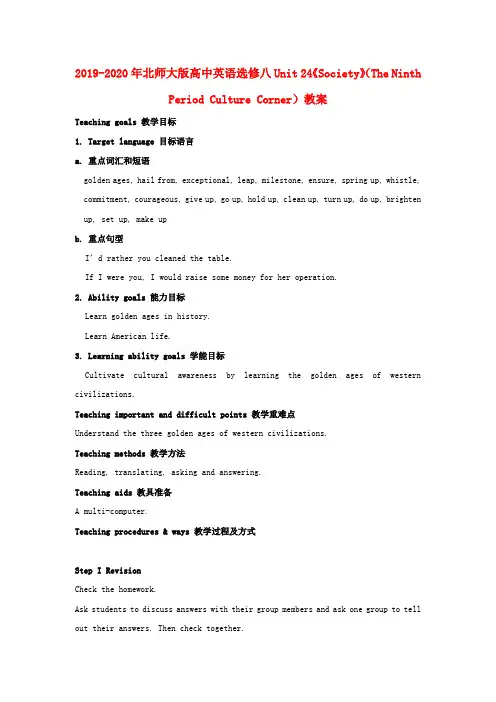
(The Ninth 2019-2020年北师大版高中英语选修八Unit 24《Society》Period Culture Corner)教案Teaching goals 教学目标1. Target language 目标语言a. 重点词汇和短语golden ages, hail from, exceptional, leap, milestone, ensure, spring up, whistle, commitment, courageous, give up, go up, hold up, clean up, turn up, do up, brighten up, set up, make upb. 重点句型I’d rather you cleaned the table.If I were you, I would raise some money for her operation.2. Ability goals 能力目标Learn golden ages in history.Learn American life.3. Learning ability goals 学能目标Cultivate cultural awareness by learning the golden ages of western civilizations.Teaching important and difficult points 教学重难点Understand the three golden ages of western civilizations.Teaching methods 教学方法Reading, translating, asking and answering.Teaching aids 教具准备A multi-computer.Teaching procedures & ways 教学过程及方式Step I RevisionCheck the homework.Ask students to discuss answers with their group members and ask one group to tell out their answers. Then check together.Step II Culture CornerAsk students if they know what golden ages are and what the golden ages of Chinese history were.Ask students to have a discussion in groups. Let some group representatives tell their ideas.T: What are golden ages?S1: I think golden ages are important periods that can make their mark on history. T: OK, what were the golden ages of Chinese history?S2: I think Tang Dynasty is a golden age of Chinese history.S3: In my opinion, the times under Kangxi and Qianlong were also golden ages in history.T: Good. Let’s learn three golden ages in the world history. Now read the text and then answer the questions below.Check answers by having students read their answer; show the suggested answers on the PowerPoint.Suggested answers:1 They all made exceptional leaps forward in cultural, scientific and socialachievements.2 Because they wanted to ensure that there was a good supply of educated laborersto work in the Florentine Economy.3 Because both poor people and wealthy merchants looked for ways of enjoyingthemselves and learning new things about the world.Step III Check your progressRead the text: America is work: “Whistle while you work” to learn about life in America and American social culture. And do the post reading exercises.Deal with Ex 1&2Ask students to work individually and then compare answers with their partner. Check the answers with the whole class.Deal with Ex 3Ask students to work individually and check answers by having individuals read out their answers. Remind students to look back to Function File on Page 37 if they have some difficulties with the expressions used for suggestions and requests. Suggested answers to Ex 3:2 I’d rather you cleared the table yourself…;3 It’s high time that they got down to…;4 …demanded that I stay at home and do some …;5 You’d/had better put on…;6 The headmaster insisted that every child (should) have…;7 If I were you, I would raise…,8 It’s about time Tom started studying…;9 You ought t stay in bed for several days and take…;10 …suggested widening/that we (should) widen…;11 Barbara had better stop…Deal with Ex 4Students do the exercise individually, and then check answers by having individuals read out their answers.Deal with Ex 5Ask students to do the exercise individually and then compare answers with each other. Check the answers by having individuals write their answers on the board. And correct the answers with the whole class.Step IV Bulletin BoardDeal with Bulletin BoardT: OK. We have learnt much about the society; let’s pay attention to the world around us. Our socialist construction is changing the face of our hometown day by day.Have you seen any changes in our hometown over the last few years?S: Yes, our hometown has changed a lot over the last few years. The streets used to be very dirty. The sky was grey. The trees and flowers were often covered withdirty. Now, the government has closed down some of the factories that were causing serious pollution. And some factories have invested money in building a pollution control centre, which can reduce pollution and re-use resources as well. Of course the air is clean again. And the streets look more comfortable.T: Good. We all should enhance the awareness of environmental protection and builda harmonious c ommunity. Now please read the example on the Bulleting Board. Thenwrite down changes in our hometown and put it on the board.Step V SummaryUnit diaryGet students to assess their learning over the unit. By completing unit diary students will learn what their difficulty is and what they should do to improve their English and make adjustments and plans for their further learning.附件I. 课文注释与疑难解析1.Tr ade unions demand that the government shorten the working week. 工会要求政府缩短每周工作时间。
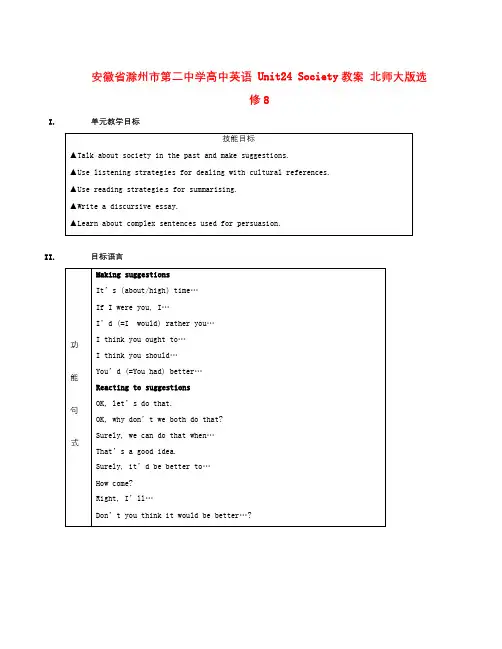
安徽省滁州市第二中学高中英语 Unit24 Society教案北师大版选修8I.单元教学目标Use reading strategie s for summarising.II.目标语言poster skip edition alleyc loud on lose faith in do away with on principle at risklIII.教材分析与教材重组1. 教材分析本单元以“社会”为话题,我们每个人都处于大大小小的社会中。
如果脱离社会,我们每个人都无法正常生存下去,所以我们每个人都应为建立一个和谐社会而努力奋斗。
本单元的课文及练习的设计全部围绕本单元话题——社会展开。
单元共分8个小板块,板块序列为:单元话题导入阅读(语法)听力(技能)阅读(技能)表达(写作和口头表述)Language Awareness(语法)文化交流Bulletin Board。
本单元要求学生掌握虚拟语气及情态动词表达建议的复杂句型。
本单元还向学生提供了阅读技巧、听力技巧和口头技巧,以便提高他们的综合语言技能。
最后要求学生按照写作指导写一篇关于社会犯罪与处罚的短文。
教材设计体现了跨学科的特点。
本单元通过学习消费型社会、乌托邦、变化的世界、犯罪与处罚等文章,内容涉及中西方文化,帮助学生了解文化差异的同时使他们对本国文化有了更深的理解。
文章内容紧贴生活,具有现实意义,为中学生所感兴趣,并对中学生的生活消费观具有引导意义。
本单元还介绍了我国古建筑艺术——胡同,让学生了解我国的本土艺术文化,珍惜文化遗产。
教师要借助听、说、读、写等一系列扎实有效的教学活动,提高语言运用能力的同时,拓展学生的思维空间,增强学生的社会文化意识。
1.1本板块的第一部分是阅读。
活动设计共有三个:Activity 1是Pre-reading activity,目的是通过照片、文章题目鼓励学生来猜测文章内容,激活学生的背景知识,提高阅读理解能力。
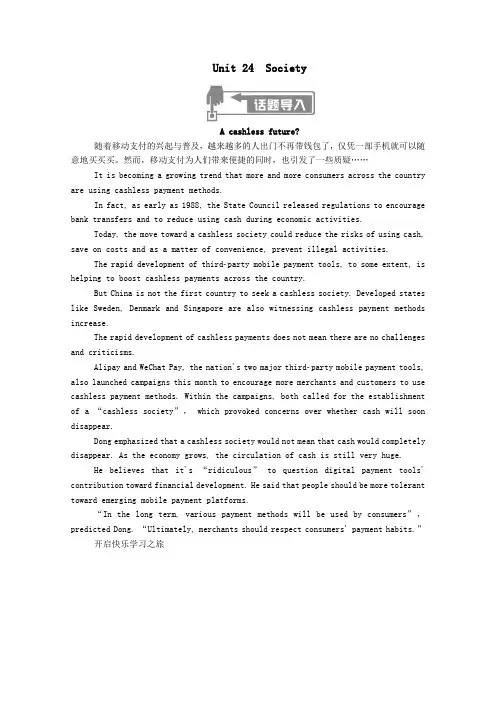
Unit 24 SocietyA cashless future?随着移动支付的兴起与普及,越来越多的人出门不再带钱包了,仅凭一部手机就可以随意地买买买。
然而,移动支付为人们带来便捷的同时,也引发了一些质疑……It is becoming a growing trend that more and more consumers across the country are using cashless payment methods.In fact, as early as 1988, the State Council released regulations to encourage bank transfers and to reduce using cash during economic activities.Today, the move toward a cashless society could reduce the risks of using cash, save on costs and as a matter of convenience, prevent illegal activities.The rapid development of thirdparty mobile payment tools, to some extent, is helping to boost cashless payments across the country.But China is not the first country to seek a cashless society. Developed states like Sweden, Denmark and Singapore are also witnessing cashless payment methods increase.The rapid development of cashless payments does not mean there are no challenges and criticisms.Alipay and WeChat Pay, the nation's two major thirdparty mobile payment tools, also launched campaigns this month to encourage more merchants and customers to use cashless payment methods. Within the campaigns, both called for the establishment of a “cashless society”, which provoked concerns over whether cash will soon disappear.Dong emphasized that a cashless society would not mean that cash would completely disappear. As the economy grows, the circulation of cash is still very huge.He believes that it's “ridiculous” to question digital payment tools' contribution toward financial development. He said that people should be more tolerant toward emerging mobile payment platforms.“In the long term, various payment methods will be used by consumers”,predicted Dong. “Ultimately, merchants should respect consumers' payment habits.”开启快乐学习之旅Period One Warmup & Lesson 1Consumer SocietyⅠ.重点单词1.burden n. 重担,负担2.signature n. 签名3.choke vi. 窒息,噎住4.rag n. 破旧衣服5.bare adj. 赤裸的6.pension n. 退休金,养老金7.ownership n. 所有权8.pregnant adj. 怀孕的9.deposit vt.& vi. 存储,储蓄n. 存款;押金,保证金10.format n. 格式v. 格式化(计算机磁盘)11.inequality n. 不平等→equality n. 平等12.voluntary adj. 自愿的→voluntarily adv. 自愿地→volunteer v. 自愿做n. 志愿者13.abundant adj. 大量的,充裕的,丰富的→abundantly adv. 大量地→abundance n. 充裕,丰富14.vacant adj. 未住人的,空置的→vacantly adv. 神情茫然地15.govern vt. 统治,管理→governor n. (美国的)州长→government n. 政府16.accumulate v. 积累→accumulative adj. 累积的,逐渐增加的→accumulation n. 积累17.adjustment n. 调整,调节→adjust vi. 调整,调节→adjustable adj. 可调整的,可调节的18.diverse adj. 各种各样的→diversity n. 多样性,多元体19.resign vt.& vi. 辞职→resignation n. 辞职,辞职信20.shrink vi. (使)收缩,缩小→shrinkage n. 缩小,缩小量21.homelessness n. 无家可归→homeless adj. 无家可归的→home n. 家庭Ⅱ.核心短语1.on_the_increase 在上升2.be_trapped_in 陷入……3.on the one hand...on the other hand...一方面……另一方面……4.hand_over 移交,交给5.be_better_off 境况更良好;更富裕6.come into being 开始存在;形成7.apart from 除……之外8.be short of 缺少9.wind sb. up 故意惹恼某人(尤指开玩笑)10.in a mess 杂乱Ⅲ.经典句式1.not...but... 不是……而是……Not increased happiness, but stress and less free time to be ourselves and enjoy being with our friends and families.我们不是更快乐了,而是压力增加了,留给自己、朋友和家人的自由时间更少了。
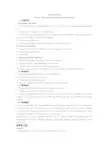
Unit 24 SocietyPeriod 1 Warm-up & Lesson 1 Consumer Society(1)三维目标A. Knowledge and skills1)To improve students’ reading ability by finishing some exercises from the information in the text.2)To exchange viewpoints on consumer society.3)To practise using complex sentences in written and spoken English to persuade, using verbs such as should, ought to, insist, demand, suggest.4)To practise giving advice.5)Guess the main idea of the text through the title and some pictures.B. Process and methods1)Learn the new words and phrases and read the passage several times.2)Individual and group work.3)Discussion.C. Emotion, attitude and values1)Enable the students to talk about some social problems;2)Master some new words and phrases of the lesson.3)Improve reading skills and identify paragraph topics.4)Get the students to know the differences of some structures eg. should and ought to.(2)教学重点1)Help the students master the new words and phrases.2)Introduce what a discursive essay is.3)Grammar: the subjunctive mood.4)Have the students form a positive attitude towards consumption.(3)教学难点1)Some students may have difficulty in listening to a report.2)Making suggestions on a certain social issue.3)Grammar: The subjunctive mood is used in some cases to show that something is not certain to happen or something should be done. When the infinitive is “be”, then “should” is sometimes omitted.(4)教学建议The lesson is mainly about consumption in our society. It points out that we live as a consumer not as someone who is a VIP. Therefore, it is very important to know how to consume healthily. Teachers should advocate healthy lifestyles of consuming. There are some important new words and phrases. Students should be requested to master them.Subjunctive mood is an important point as well as a difficult point in the College Entrance Examination. There are several these structures in the lesson. Students should be told to be careful about them.新课导入设计Sample11. Brainstorming: Think of as many social problems as you can.Suggested answers: poverty, racial discrimination, gender discrimination, inequality, aging problem, drugs, violence, homelessness, unemployment, abortion, homosexuality, hunger, water shortage2. Which do you think is the most severe problem in our society? Which in western world? Students’ answers will be varied.Sample 2What is your ways of consumption? Do you think it is healthy?Students’ answers will be varied.4.How do you spend your pocke money? How about your friends?Students’ answers will be varied.。
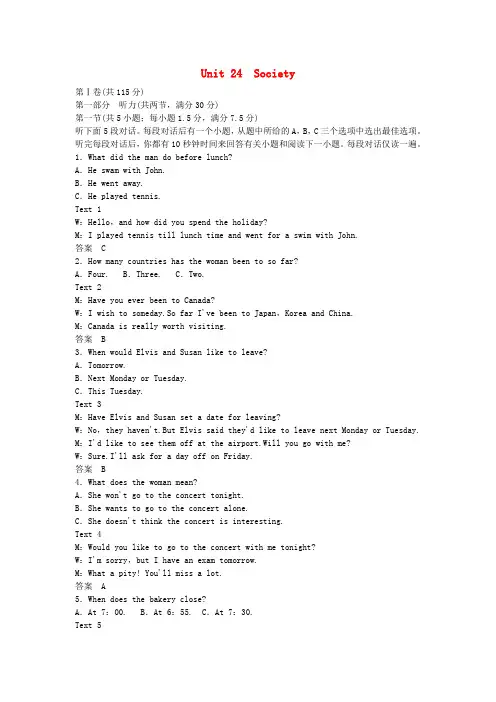
Unit 24 Society第Ⅰ卷(共115分)第一部分听力(共两节,满分30分)第一节(共5小题;每小题1.5分,满分7.5分)听下面5段对话。
每段对话后有一个小题,从题中所给的A,B,C三个选项中选出最佳选项。
听完每段对话后,你都有10秒钟时间来回答有关小题和阅读下一小题。
每段对话仅读一遍。
1.What did the man do before lunch?A.He swam with John.B.He went away.C.He played tennis.Text 1W:Hello,and how did you spend the holiday?M:I played tennis till lunch time and went for a swim with John.答案 C2.How many countries has the woman been to so far?A.Four. B.Three. C.Two.Text 2M:Have you ever been to Canada?W:I wish to someday.So far I've been to Japan,Korea and China.M:Canada is really worth visiting.答案 B3.When would Elvis and Susan like to leave?A.Tomorrow.B.Next Monday or Tuesday.C.This Tuesday.Text 3M:Have Elvis and Susan set a date for leaving?W:No,they haven't.But Elvis said they'd like to leave next Monday or Tuesday. M:I'd like to see them off at the airport.Will you go with me?W:Sure.I'll ask for a day off on Friday.答案 B4.What does the woman mean?A.She won't go to the concert tonight.B.She wants to go to the concert alone.C.She doesn't think the concert is interesting.Text 4M:Would you like to go to the concert with me tonight?W:I'm sorry,but I have an exam tomorrow.M:What a pity! You'll miss a lot.答案 A5.When does the bakery close?A.At 7:00. B.At 6:55. C.At 7:30.Text 5M:Kate,are we going home now?W:I was hoping to get some bread from the bakery before it closes.M:My watch says 6:55,so we have about 35 minutes left to get there.答案 C第二节(共15小题;每小题1.5分,满分22.5分)听下面5段对话或独白。
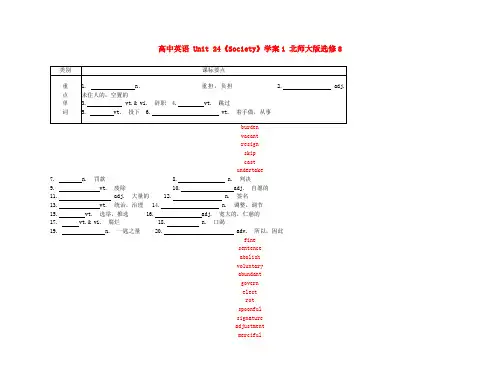
高中英语 Unit 24《Society》学案1 北师大版选修8burdenvacantresignskipcastundertake7. n. 罚款 8. n. 判决9. vt. 废除 10. adj. 自愿的11. adj. 大量的 12. n. 签名13. vt. 统治,治理 14. n. 调整,调节15. vt. 选举,推选 16. adj. 宽大的,仁慈的17. vt.& vi. 腐烂 18. n. 口渴19. n. 一匙之量 20. adv. 所以,因此finesentenceabolishvoluntaryabundantgovernelectrotspoonfulsignatureadjustmentmercifulthirstconsequentlycome__into__beingknock__into__sbbreak__intoon__principle sentence__sb.to__death __thone__increase/decrease be__well__off/better__off do__away__withcontribute__toshow__offinsistingbegivenit’shightimetook seriously.tokeepaneyeonAs placed onburden n.负担;重担;担子;责任;vt.使负重担(如债务、捐税等);劳累to be a burden to sb./sth.是……的负担to bear/ease/share the burden 承受/减轻/分担重担,He is always a burden to his parents.他永远是他父母的负担。
The Education Department of China has insisted on easing the burden of students.中国教育部坚决主张减轻学生的负担。
安徽省滁州市第二中学高中英语 Unit 24 Society The Sixth Period Writing教案北师大版选修8Teaching goals 教学目标1. Target language 目标语言a. 重点词汇和短语break into, fine, sentence, abolish, on principle, sentence sb. to death, consequently, due to, as a result of, in order to, moreover, furthermoreb. 重点句子What is even more unbelievable is the fact that some murderers are let out of prison after three or four years.I think we should bring back much harder sentences in this country …I also believe we should bring the death penalty back to this country as in the States.I am totally against harder sentences on principle and really feel the death penalty should be abolished.2. Ability goals 能力目标Learn to write a discursive essay.3. Learning ability goals 学能目标Enable students to know how to write a discursive essay.Teaching important and difficult points 教学重难点Enable students to know how to write a discursive essay.Teaching methods 教学方法Asking and answering; pair work.Teaching aids 教具准备A multi-computer.Teaching procedures & ways 教学过程及方式Step I Revision and leading inCheck the homework to the vocabulary exercises.T: The topic of this unit is “Society”. Who would like to say something about what we have learned in this unit up to now?S: In the first period we have learned something about the social problems of England.From lesson 1, we learned about the consumer society. And we should remember that “being” and “doing” are much more important than “having”. From lesson 2, we learned about the western ideal society Utopia. From lesson 3, we learn about the cultu re of Beijing’s Hutongs —its past and present. …T: Good! To learn the language of English well, we should learn the social culture as well. Try to learn about the differences between cultures.Punishment: the death penalty, fine, prison sentence, soft/hard sentences, life sentenceSs: (repeat)T: Well, please work in pairs, discussing which of the crimes are a big problem in our own society? What punishments would you give for the crimes? You can check the meanings of the key words in the vocabulary list before your discussion.A sample:S1: I think break in is the biggest problem now. I’ve heard of a fe w cases of break in recently. The criminals broken in and shot two office workers to death. S2: Yes. It’s very horrid. I think the criminals should be given hard sentence. Deal with Ex 2Ask students to work individually first, then discuss with the whole class.T: I’m glad you have had a heated discussion. Next, read the two letters to a newspaper on Page 40. From the title and the photo we can know the two letters are both about crime an d punishment. But they hold different ideas. First read individually and decide which one you agree with most.After six minutesLet students talk about their opinions.S3: I agree with the first letter. I think criminals should pay for what they have done. And they shouldn’t be let off with fines. When a person has killed somebody, they don’t deserve to live.S4: I agree with the second one. I think every person is good by nature. And the primary goal of punishment should be to reform th e person who has committed the crime. We need to help and reform criminals in order to make them into useful members of the community.S5: Yes. We should give opportunities to those who would like to repent. And the death penalty is a cruel form of punishment which is against human dignity. S6: I agree with the first one. If a drug dealer or robber can be out on the streets only a few weeks or months after committing their crimes, or even get let off with fines, they would be dangerous and our community would be at risk then. S7: Yes, as a result, many people will lose faith in justice.Step III PracticeT: Well, from the two letters, we know something about t he crime and punishment in Britain and the USA. Next, let’s do Ex 3 on Page 41. The sentences (1-8) are from a discursive essay, and they are not as personal as the opinions in the two letters. Now what you should do is to match the sentences with personal opinion in the two letters. You can work in pairs.Check the answer by asking individual students to read out their answers. Suggested answers:1 I think we should bring back much har der sentences.2 I totally agree with the American idea of “three strikes and out”.3 They have become like luxury hotels with televisions and gyms.4 I also believe we should restore capital punishment in this country.5 We also need to think about the wishes of the families and friends.6 I am totally against harder sentences on principle.7 Capital punishment is judicial murder.8 It is a savage form of punishment which is against human dignity.Deal with Ex 4.T: Look at the linking words. Which introduce reason and which introduce result? Ss: Consequently, so that, as a result of introduce result; while due to, just because, so much and in order to introduce reason.Then students do the exercise individually. Then compare answers in pairs before checking answers as a class.Check students’ answers by having individuals read out their answers.Step Ⅳ WritingStudents will be asked to write an essay discussing the statement: The only way to cut crime in our country is to make punishment more severe.First teacher should explain the stages of writing a discursive essay. Students are given time to discuss. Students can work in pairs, listing the arguments for and against each statement and adding their own arguments and reasons.T: We are going to write a discursive essay. You may think it is easy to write it, but to write a good article is not such an easy task. So let’s first learn the basic stages of writing such kind of composition.Show the following on the screen.Stage 1 list arguments “for” and “against” the statement, add reasons Stage 2 write a layout of your essayStage 3 write the essay (pay attention to style, useful vocabulary, linking)Stage 4 check your essayT: Are you clear?Ss: Yes.T: There is also something you should pay attention to. First, you should list enough information about your topic; don’t omit the necessar y information points; all content is relevant to the topic. Second, organize your ideas properly, ideas are clearly stated or supported; ideas should be to the point. At last, try to make your writing move on naturally and coherent. These are the basic rules and keep them in mind when writing. I think you should prepare the passage well after class and finish writing the passage before the next period.Step Ⅴ HomeworkT: After class, please finish exercises in Focus on Writing on Pages 88 & 89 to consolidate what we’ve learned today. After you finish the writing, first work in pairs and rea d each other’s articles. Then comment on and discuss the arguments in both essays to improve your essays. Understand?Ss: Yes.T: Right. You are required to hand it in before the next period.Many people feel that harder sentences should be brought back so that criminals are made to pay for what they have done. And the dea th penalty shouldn’t be abolished only this can our society be protected and young people be prevented from leading a life of crime. In addition, some people say that conditions in prisons are too soft and the wishes of victims’ family and friends possibly need to be taken into account.However, others don’t hold the same view. There are arguments against harder sentences and the death pe nalty. They think the death penalty is murder and no better than any other murder. Furthermore, the death penalty is too cruel and against human dignity.In my opinion, the primary goal of punishment should be to reform the person who has committed the crime. We need to help and reform criminals in order to make them into useful members of the community.。
高中英语真题:学高中英语Unit24SocietyTheSixthPeriodWriting教案北师大版选修8Teaching goals 教学目标1. Target language 目标语言a. 重点词汇和短语break into, fine, sentence, abolish, on principle, sentence sb. to death, consequently, due to, as a result of, in order to, moreove r, furthermoreb. 重点句子What is even more unbelievable is the fact that some murderer s are let out of prison after three or four years.I think we should bring back much harder sentences in this cou ntry …I also believe we should bring the death penalty back to this co untry as in the States.I am totally against harder sentences on principle and really feel the death penalty should be abolished.2. Ability goals 能力目标Learn to write a discursive essay.3. Learning ability goals 学能目标Enable students to know how to write a discursive essay. Teaching important and difficult points 教学重难点Enable students to know how to write a discursive essay. Teaching methods 教学方法Asking and answering; pair work.Teaching aids 教具准备A multi-computer.Teaching procedures & ways 教学过程及方式Step I Revision and leading inCheck the homework to the vocabulary exercises.T: The topic of this unit is “Society”. Who would like to say som ething about what we have learned in this unit up to now?S: In the first period we have learned something about the socia l problems of . From lesson 1, we learned about the consumer s ociety. And we should remember that “being” and “doing” are m uch more important than “having”. From lesson 2, we learned a bout the western ideal society Utopia. From lesson 3, we learn about the culture of ’s Hutongs — its past and present. …T: Good! Tolearn the language of English well, we should learn the social c ulture as well. Try to learn about the differences between cultur es.Punishment: the death penalty, fine, prison sentence, soft/hard sentences, life sentenceSs: (repeat)T: Well, please work in pairs, discussing which of the crimes ar e a big problem in our own society? What punishments would y ou give for the crimes? You can check the meanings of the key words in the vocabulary list before your discussion.A sample:S1: I think break in is the biggest problem now. I’ve heard of a f ew cases of break in recently. The criminals broken in and shot t wo office workers to death.S2: Yes. It’s very horrid. I think the criminals should be given ha rd sentence.Deal with Ex 2Ask students to work individually first, then discuss with the who le class.T: I’m glad you have had a heated discussion. Next, read the tw o letters to a newspaper on Page 40. From the title and the pho to we can know the two letters are both about crime and punishment. But they hold different ideas. First read individual ly and decide which one you agree with most.After six minutesLet students talk about their opinions.S3: I agree with the first letter. I think criminals should pay for w hat they have done. And they shouldn’t be let off with fines. Wh en a person has killed somebody, they don’t deserve to live.S4: I agree with the second one. I think every person is good by nature. And the primary goal of punishment should be toreform the person who has committed the crime. We need to help and re form criminals in order to make them into useful members of th e community.S5: Yes. We should give opportunities to those who would like to repent. And the death penalty is a cruel form of punishment w hich is against human dignity.S6: I agree with the first one. If a drug dealer or robber can be o ut on the streets only a few weeks or months after committing t heir crimes, or even get let off with fines, they would be danger ous and our community would be at risk then.S7: Yes, as a result, many people will lose faith in justice.Step III PracticeT: Well, from the two letters, we know something about the crime and punishment in Britain and the . Next, let’s do Ex 3 on Page 41. The sentences (1-8) are from a discursive essay, and they are not as personal as the opinions in the two letters. Now what you should do is to ma tch the sentences with personal opinion in the two letters. You c an work in pairs.Check the answer by asking individual students to read out thei r answers.Suggested answers:1 I think we should bring back much harder sentences.2 I totally agree with the Americanidea of “three strikes and out”.3 They have become like luxury hotels with televisions and gyms.4 I also believe we should restore capital punishment in this cou ntry.5 We also need to think about the wishes of the families and friends.6 I am totally against harder sentences on principle.7 Capital punishment is judicial murder.8 It is a savage form of punishment which is against human dig nity.Deal with Ex 4.T: Look at the linking words. Which introduce reason and which introduce result?Ss: Consequently, so that, as a result of introduce result; while due to, just because, so much and in order to introduce reason.Then students do the exercise individually. Then compare answ ers in pairs before checking answers as a class.Check students’ answers by having individuals read out their an swers.Step Ⅳ WritingStudents will be asked to write an essay discussing the stateme nt: The only way to cut crime in our country is to make punishm ent more severe.First teacher should explain the stages of writing a discursive e ssay. Students are given time to discuss. Students can work in pairs, listing the arguments for and against each statement and adding their own arguments and reasons.T: We are going to write a discursive essay. You may think it is easy to write it, but to write a good article is not such an easy ta sk. So let’s first learn the basic stages of writing such kind of co mposition.Show the following on the screen.Stage 1 list arguments “for” and “against” the statement, ad d reasonsStage 2 write a layout of your essayStage 3 write the essay (pay attention to style, useful vocab ulary, linking)Stage 4 check your essayT: Are you clear?Ss: Yes.T: There is also something you should pay attention to. First, you should list enough information about your topic; don’t omit the necessary information points; all content is relevant to the topic . Second, organize your ideas properly, ideas are clearly stated or supported; ideas should be to the point. At last, try to make y our writing move on naturally and coherent. These are the basic rules and keep them in mind when writing. I think you should pr epare the passage well after class and finish writing the passag e before the next period.Step Ⅴ HomeworkT: After class, please finish exercises in Focus on Writing on Pa ges 88 & 89 to consolidate what we’ve learned today. After you finish the writing, first work in pairs and read each other’s articles. Then comment on and discuss the argu ments in both essays to improve your essays. Understand? Ss: Yes.T: Right. You are required to hand it in before the next period.Many people feel that harder sentences should be brought back so that criminals are made to pay for what they have done. An d the death penalty shouldn’t be abolished only this can our soc iety be protected and young people be prevented from leadinga life of crime. In addition, some people say that conditions in pr isons are too soft and the wishes of victims’ family and friends p ossibly need to be taken into account.However, others don’t hold the same view. There are argument s against harder sentences and the death penalty. They think the death penalty is murder and no better than any other murder. Furthermore, the death penalty is too cruel a nd against human dignity.In my opinion, the primary goal of punishment should be to refo rm the person who has committed the crime. We need to help a nd reform criminals in order to make them into useful members of the community.学高中英语Unit24SocietyTheSixthPeriodWriting教案北师大版选修8Teaching goals 教学目标1. Target language 目标语言a. 重点词汇和短语break into, fine, sentence, abolish, on principle, sentence sb. to death, consequently, due to, asa result of, in order to, moreover, furthermoreb. 重点句子What is even more unbelievable is the fact that some murderers are let out of prison after three or four years.I think we should bring back much harder sentences in this country …I also believe we should bring the death penalty back to this country as in the States.I am totally against harder sentences on principle and really feel the death penalty should be ab olished.2. Ability goals 能力目标Learn to write a discursive essay.3. Learning ability goals 学能目标Enable students to know how to write a discursive essay.Teaching important and difficult points 教学重难点Enable students to know how to write a discursive essay.Teaching methods 教学方法Asking and answering; pair work.Teaching aids 教具准备A multi-computer.Teaching procedures & ways 教学过程及方式Step I Revision and leading inCheck the homework to the vocabulary exercises.T: The topic of this unit is “Society”. Who would like to say something about what we have learn ed in this unit up to now?S: In the first period we have learned something about the social problems of . From lesson 1, w e learned about the consumer society. And we should remember that “being” and “doing” are m uch more important than “having”. From lesson 2, we learned about the western ideal society Ut opia. From lesson 3, we learn about the culture of ’s Hutongs — its past and present. …T: Good! Tolearn the language of English well, we should learn the social culture as well. Try to learn about the differences between cultures.Punishment: the death penalty, fine, prison sentence, soft/hard sentences, life sentenceSs: (repeat)T: Well, please work in pairs, discussing which of the crimes are a big problem in our own societ y? What punishments would you give for the crimes? You can check the meanings of the key w ords in the vocabulary list before your discussion.A sample:S1: I think break in is the biggest problem now. I’ve heard of a few cases of break in recently. The criminals broken in and shot two office workers to death.S2: Yes. It’s very horrid. I think the criminals should be given hard sentence.Deal with Ex 2Ask students to work individually first, then discuss with the whole class.T: I’m glad you have had a heated discussion. Next, read the two letters to a newspaper on Pag e 40. From the title and the photo we can know the two letters are both about crime and punishment. But they hold different ideas. First read individually and decide which one you ag ree with most.After six minutesLet students talk about their opinions.S3: I agree with the first letter. I think criminals should pay for what they have done. And they sh ouldn’t be let off with fines. When a person has killed somebody, they don’t deserve to live.S4: I agree with the second one. I think every person is good by nature. And the primary goal of punishment should be to reform the person who has committed the crime. We need to help and reform criminals in order to make them into useful members of the community.S5: Yes. We should give opportunities to those who would like to repent. And the death penalty is a cruel form of punishment which is against human dignity.S6: I agree with the first one. If a drug dealer or robber can be out on the streets only a few wee ks or months after committing their crimes, or even get let off with fines, they would be dangero us and our community would be at risk then.S7: Yes, as a result, many people will lose faith in justice.Step III PracticeT: Well, from the two letters, we know something about the crime and punishment in Britain and the . Next, let’s do Ex 3 on Page 41. The sentences (1-8) are from a discursive essay, and they are not as personal as the opinions in the two letters. N ow what you should do is to match the sentences with personal opinion in the two letters. You c an work in pairs.Check the answer by asking individual students to read out their answers.Suggested answers:1 I think we should bring back much harder sentences.2 I totally agree with the American idea of “three strikes and out”.3 They have become like luxury hotels with televisions and gyms.4 I also believe we should restore capital punishment in this country.5 We also need to think about the wishes of the families and friends.6 I am totally against harder sentences on principle.7 Capital punishment is judicial murder.8 It is a savage form of punishment which is against human dignity.Deal with Ex 4.T: Look at the linking words. Which introduce reason and which introduce result?Ss: Consequently, so that, as a result of introduce result; while due to, just because, so much a nd in order to introduce reason.Then students do the exercise individually. Then compare answers in pairs before checking ans wers as a class.Check students’ answers by having individuals read out their answers.Step Ⅳ WritingStudents will be asked to write an essay discussing the statement: The only way to cut crime in our country is to make punishment more severe.First teacher should explain the stages of writing a discursive essay. Students are given time to discuss. Students can work in pairs, listing the arguments for and against each statement and a dding their own arguments and reasons.T: We are going to write a discursive essay. You may think it is easy to write it, but to write a go od article is not such an easy task. So let’s first learn the basic stages of writing such kind of co mposition.Show the following on the screen.Stage 1 list arguments “for” and “against” the statement, add reasonsStage 2 write a layout of your essayStage 3 write the essay (pay attention to style, useful vocabulary, linking)Stage 4 check your essayT: Are you clear?Ss: Yes.T: There is also something you should pay attention to. First, you should list enough information about your topic; don’t omit the necessary information points; all content is relevant to the topic. Second, organize your ideas properly, ideas are clearly stated or supported; ideas should be to the point. At last, try to make your writing move on naturally and coherent. These are the basic rules and keep them in mind when writing. I think you should prepare the passage well after cla ss and finish writing the passage before the next period.Step Ⅴ HomeworkT: After class, please finish exercises in Focus on Writing on Pages 88 & 89 to consolidate what we’ve learned today. After you finish the writing, first work in pairs and read each other’s articles. Then comment on and discuss the arguments in both essays to improve your essays. Understand?Ss: Yes.T: Right. You are required to hand it in before the next period.Many people feel that harder sentences should be brought back so that criminals are made to p ay for what they have done. And the death penalty shouldn’t be abolished only this can our soci ety be protected and young people be prevented from leading a life of crime. In addition, some people say that conditions in prisons are too soft and the wishes of victims’ family and friends p ossibly need to be taken into account.However, others don’t hold the same view. There are arguments against harder sentences and the death penalty. They think the death penalty is murder and no better than any other murder. Furthermore, the death penalty is too cruel and against human dignity.In my opinion, the primary goal of punishment should be to reform the person who has committ ed the crime. We need to help and reform criminals in order to make them into useful members of the community.。
Unit 24 Society Period Four Lesson 3 A Changing World 课时精练(北师大版选修8,课标通用)时间:30分钟Ⅰ.完成句子1.如果我是你的话,我不会那么生气。
If I were you,I ______________________.2.你最好亲自去跟他说这件事情。
____________________ about it by yourself.3.妈妈坚决要求他一个小时内完成作业。
His mother insisted that ______________________ in an hour.4.我想你应该立刻去找医生看看。
I think ______________________ right away.5.到了你向她求助的时候了。
It is about time that ________________________.答案 1.I wouldn't be so angry 2.You'd better tell him 3.he finish his homework 4.you should go to see the doctor5.you turned to her for helpⅡ.选词填空keep an eye on;date back;refer to;keep control over;cast a dark cloud on;have a thirst for...1.I don't want anything to drink.I only ______ knowledge.2.The political situation ________ China's economy towards the end of the Qing Dynasty.3. They were able to place guards at the entrances of the hutongs,which made it easier to ________ people's movements.4.Hutong now also ________ the courtyards themselves and even to the communities that live there.5.Beijing's hutongs helped the Emperors to ______ the city.6.When in Beijing,we can walk up Sanmiao street,which ________ 900 years.答案 1.have a thirst for 2.cast a dark cloud on 3.keep an eye on 4.refers to 5.keep control over 6.dates backⅢ.单项填空1.Although the ________ of the representatives were against the regulation, the chairman of the conference eventually persuaded them to pass it.A.majority B.major C.minor D.minority解析从搭配上,可排除B、C两项;从句意上看,前面是转折,故选majority(大多数)。
答案 A2.I ________ have watched that movie—it'll give me horrible dreams. A.shouldn't B.needn't C.couldn't D.mustn't解析句意:我本不应该看那部电影——它会给我带来恶梦。
由破折号后的内容来判断,其前内容为“不该做某事而做了”。
shouldn't have done sth本来不该做某事却做了;needn'thave done sth本来不必做某事却做了;couldn't have done sth为否定推测,表示“不可能做过某事”。
答案 A3.He ________ chairman of the committee at the age of 25.A.undertook B.underwentC.underlined D.understudied解析句意:他在二十五岁时担任委员会的主席。
undertake担任;undergo经历,遭受;underline划横线;understudy充当配角,只有A项符合句意。
答案 A4.They all looked down upon him.He was ______ a singer.A.not more than B.less thanC.no more than D.more than解析由look down upon表示贬义,可知后句应表达“他只不过是个歌手而已”。
not more than与数字连用;less than少于;more than用于名词前,表示“不仅仅是”。
no more than 仅仅,符合句意。
答案 C5.In the experiment we kept a watchful eye ________ the development and recorded every detail.A.with B.on C.for D.to解析考查固定短语keep an eye on,意为“照看;密切注视”。
答案 B6.My interest in collecting stamps ________ my childhood.A.dates from B.dated fromC.dated back to D.went back to解析date back to=date from不用被动式,一般用一般现在时,故选A项。
答案 A7.We want to leave this hotel. Perhaps you can ________ us another one. A.introduce B.remindC.recommend D.suggest解析recommend sb sth向某人推荐某物。
答案 C8.George is going to talk about the geography of his country,but I'd rather he ________ more on its culture.A.focus B.focusedC.would focus D.had focused解析句意:乔治打算谈论他的国家的地理,但我宁愿他更多地把焦点集中在文化上。
would rather后接从句时,从句中的谓语动词要用虚拟语气,若表示与将来和现在的事实相反的情况,则谓语动词要用一般过去时,由上句中“is going to...”可知B项时态正确。
答案 B9.I have a ________ for knowledge and also for money.A.thirsty B.thirst C.long D.gift解析have a thirst for渴望,渴求。
thirsty为形容词,应该用be thirsty for结构;long for渴望,long为动词。
答案 B10.With so many people ________ our team,we are sure to win the match. A.back up B.supportC.backing up D.back out解析A,B两项皆有“支持”之意,但都应该用v.ing形式;D项意思不当,故选C项。
答案 C11.I was told that although these old buildings________ the Ming Dynasty,they remained in good condition.A.are dated back to B.dated back toC.date back D.have been dated back to解析句意:我被告知尽管这些古老建筑建于明代,但状态良好。
date back to“追溯到”,没有被动形式,常用于一般现在时或一般过去时,date back后常接时间段。
答案 B12.Not only the teacher but also the students________ attend the lecture. A.has to B.have to C.have D.has解析not only...but also连接的并列主语,通常根据就近原则,谓语动词的单复数要和与它相邻近的主语的数一致。
答案 B13.The damp weather rotted________ the wooden desk.A.on B.away C.in D.of解析句意:潮湿的天气使得木质桌子腐烂了。
rot away“使……腐烂”,是固定搭配。
答案 B14.China decided to cast the three foreigners________.A.down B.away C.out D.on解析句意:中国决定驱逐这三个外国人出境。
cast sb out“驱逐,赶走”。
答案 C15.It took________ building supplies to construct these energysaving houses.It took brains,too.A.other than B.more thanC.rather than D.less than解析句意:建造这些节能房屋,不仅仅要花费建筑材料,还要付出智力。
more than在句中意为“不仅仅”,修饰名词。
o ther than“不同于,除了”;rather than“而不是”;less than“不到,少于”。
答案 BⅣ.完形填空When I was a child,my mom liked to prepare food for dinner,every now and then.And I remember one night in__1__ when she made dinner after a long,hard day at work. That Monday evening so long ago,my mom__2__a plate of eggs,sausage(腊肠),and extremely burnt toast in front of my dad.I remember__3__to see if dad noticed!__4__all my dad did was reach for his toast,smile at my mom,and ask me how my day was__5__.I don't remember what I told him that night,but I do remember watching him__6__butter and jelly(果冻)on that toast and eat every__7__!When I got up from the__8__that evening,I remember hearing my mom__9__to my dad for burning the toast.And I'll never forget what he said,“Baby,I love__10__toast.”Later that night,I went to kiss Daddy goodnight and I asked him if he__11__likedhis burnt toast.He__12__me in his arms and said,“Son,your mum__13__in a hard day at work today and she's very__14__.Besides, a little burnt toast never__15__anyone!”Actually,life is full of imperfect things and imperfect people.We can't be__16__at everything we do.What I've learned over the years is that learning to accept__17__faults and choosing to celebrate each other's__18__is one of the most important keys to creating a healthy,growing,and lasting__19__.If you learn to take the good,the bad,and the ugly parts of your life as they are,you can__20__your life to the fullest.【解题导语】在外辛苦了一天的妈妈在做晚饭时把吐司烤糊了。